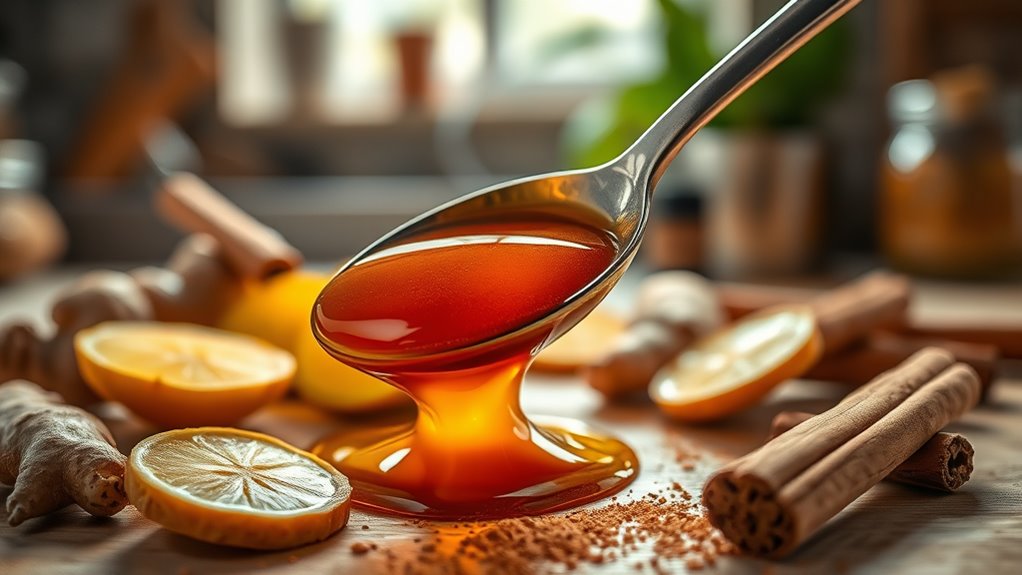This Natural Cough Syrup Works Better Than Store-Bought!
If you’ve ever reached for store-bought cough syrup, you might’ve noticed the long list of ingredients you can’t even pronounce. It’s time to consider a more natural alternative. This homemade cough syrup not only skips the artificial additives but also harnesses the healing power of simple ingredients. Curious about how easy it is to whip up your own remedy? Let’s explore what makes this natural syrup a standout choice.
The Benefits of Using Natural Ingredients
When you choose natural ingredients for your cough syrup, you’re not just opting for a remedy; you’re embracing a healthier approach to healing.
You’re joining a community that values wellness and understands the power of nature. With the best homemade cough syrup, you take control of what goes into your body, steering clear of artificial additives and preservatives.
Natural ingredients can soothe your throat, reduce inflammation, and support your immune system, creating a sense of comfort and safety. Additionally, certain natural components, such as honey’s cough-suppressing properties, have been shown to provide effective relief in clinical studies.
You’ll likely find that making your own syrup fosters a deeper connection to the ingredients you use, enhancing your overall experience. The blend of honey, lemon, and herbs not only tastes great but also brings warmth to your healing process.
Essential Ingredients for Your Cough Syrup
What makes a cough syrup truly effective? It’s all about the right ingredients.
First up, honey is a powerhouse. It soothes your throat and has natural antimicrobial properties, making it a favorite among those seeking relief. In fact, honey’s cough-suppressing abilities are supported by scientific evidence, demonstrating its effectiveness compared to common over-the-counter options.
Next, consider adding ginger, which can reduce inflammation and help thin mucus.
Then there’s lemon juice, packed with vitamin C; it boosts your immune system while adding a refreshing zing.
Don’t forget about cinnamon; its warming properties can help calm a cough.
And if you want to kick it up a notch, a sprinkle of cayenne pepper can open up your airways.
Together, these ingredients create a comforting blend that not only alleviates your symptoms but also connects you to a community of natural remedy enthusiasts.
You’re not alone in your journey to wellness—embracing these ingredients brings you closer to a healthier, happier you!
Step-by-Step Instructions for Making Your Syrup
Making your own natural cough syrup is a straightforward process that requires just a few simple steps.
First, gather your essential ingredients: honey, lemon juice, and water. In a small saucepan, combine one cup of water and half a cup of honey. Gently heat this mixture over low heat until it becomes smooth and well-blended.
Next, remove it from the heat and stir in the juice of one lemon. This adds a refreshing flavor and boosts the syrup’s effectiveness.
Once everything’s mixed, let it cool completely. You can then transfer your syrup into a clean jar or bottle with a tight lid. Store it in the refrigerator and use it as needed.
It’s comforting to know you’ve created something natural and effective, as honey has been shown to help soothe coughs in both children and adults. Share your homemade syrup with family or friends; they’ll appreciate your effort and care!
Enjoy feeling connected through this simple, nurturing remedy.
How Honey and Other Ingredients Help Relieve Cough
Homemade cough syrup not only offers a comforting remedy but also harnesses the healing properties of its ingredients. Honey, a star player in this mix, soothes your throat while providing a natural sweetness. It acts as a humectant, drawing moisture to your throat and reducing irritation. Additionally, honey’s antibacterial properties help combat infections that can exacerbate coughing.
When combined with ingredients like ginger and lemon, you’re creating a powerhouse of relief. Ginger has anti-inflammatory properties that can ease your cough, while lemon boosts your immune system with its vitamin C.
Add a pinch of cayenne pepper for an extra kick; it can help loosen mucus and clear congestion. Each ingredient works together to not just mask your cough but truly help you feel better.
You’re not just making syrup; you’re crafting a remedy that connects you to natural healing traditions. This isn’t just about relief; it’s about nurturing yourself and feeling part of a community that values wellness.
Storage and Shelf Life of Your Homemade Syrup
Once you’ve crafted your natural cough syrup, knowing how to store it properly is essential for maintaining its effectiveness.
Start by pouring the syrup into a clean, airtight glass jar or bottle. This helps prevent contamination and keeps the syrup fresh. Store it in a cool, dark place, like a pantry or cupboard, away from direct sunlight and heat.
Your homemade syrup should last about two to three weeks in optimal conditions. If you notice any changes in color, texture, or smell, it’s best to toss it out.
For longer shelf life, you can refrigerate it, which can extend its freshness to up to a month. Additionally, using ingredients known for their natural antimicrobial properties can enhance the syrup’s longevity.
Remember, sharing your homemade remedy with friends or family can create a sense of community, so keep some on hand for when they need a little TLC too!
When to Consult a Doctor for Persistent Coughs
A persistent cough can be more than just an annoyance; it’s often a signal that something’s not right in your body. Knowing when to consult a doctor can help you stay connected to your health and well-being. Here are some signs that warrant a doctor’s visit:
| Symptoms | Duration | Action |
|---|---|---|
| Cough lasting over 3 weeks | More than 3 weeks | Schedule a doctor’s visit |
| Cough with fever | Accompanying fever | Seek medical advice |
| Blood in your cough | Any time | Go to the doctor immediately |
| Difficulty breathing | Any time | Urgent medical attention |
Don’t hesitate to reach out if you notice any of these signs. It’s better to be safe than sorry. Remember, you’re not alone on this journey; seeking help shows strength and care for yourself.




